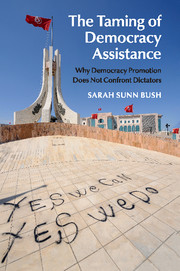9 - Should democracy promoters be set free?
from Part III - Conclusions
Published online by Cambridge University Press: 05 May 2015
Summary
Progress towards human rights is neither linear nor guaranteed … we're in a journey here.
The end of the Cold War transformed world politics in many ways. As the world moved from bipolar great power competition to American dominance, the ways that Western countries interacted with the developing world changed. For one thing, the foreign economic aid transferred from wealthy industrialized states to poorer states dropped significantly. When foreign aid increased again in the twenty-first century, it was notably different: Western countries and international institutions used aid less as a geostrategic tool and more as a way to genuinely support development and good governance in needy countries.
Western countries and international institutions also reoriented their support for democracy in the developing world. Whereas American support for anti-communist tyrants during the Cold War was infamous, the United States increasingly – though not uniformly – prioritized democracy abroad after the collapse of the Soviet Union. Other advanced democracies and international institutions, such as the European Union and the United Nations, also prioritized democracy promotion. As the third wave of democratization swept through Africa, Asia, Europe, and Latin America, international actors did their best to support and advance democratic transitions in many countries around the world.
This book has aimed to improve our understanding of democracy assistance after the end of the Cold War. International democracy promotion represents the first and largest sustained attempt by many states and international organizations to transform the domestic political practices and institutions of other countries while generally still preserving those states’ sovereignty. The goals of democracy promoters are urgent: according to Freedom House in 2014, 2.5 billion people, or 35 percent of the world's population, live in conditions that are fundamentally “not free.” Highly repressive regimes, from North Korea to Equatorial Guinea, continue to intimidate and jail dissidents.
- Type
- Chapter
- Information
- The Taming of Democracy AssistanceWhy Democracy Promotion Does Not Confront Dictators, pp. 211 - 232Publisher: Cambridge University PressPrint publication year: 2015

